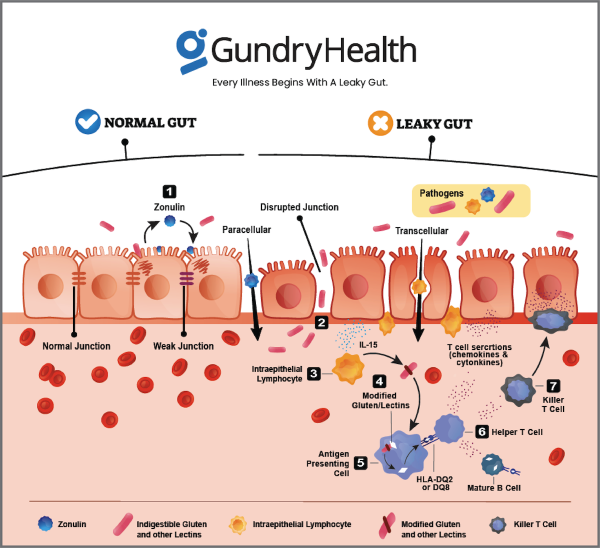Understanding Inflammatory Arthritis Symptoms and Treatment Options
Find out how Dr. Gundry’s lectin free diet and lifestyle change relive and eliminate inflammatory arthritis symptoms
Inflammatory arthritis is a group of autoimmune diseases that primarily affect the joints, causing chronic inflammation, extreme pain, joint swelling and more. Inflammatory arthritis affects millions of people in US. Like other autoimmune diseases inflammatory arthritis causes the immune system to mistakenly attack the healthy tissue. In this disease the immune system attacks the lining around the muscles and joints. These conditions can significantly impact a person’s quality of life and daily functioning. In this article, we will explore the common symptoms associated with inflammatory arthritis and discuss various treatment options available including lifestyle and diet.
Making Hard, Easy.
Common Symptoms:
Inflammatory arthritis can manifest with a range of symptoms, which may vary in intensity and duration among individuals. Some of the most common symptoms include:
- Joint Pain:
Persistent joint pain and stiffness are hallmark symptoms of inflammatory arthritis. The joint pain associated with inflammatory arthritis is usually a throbbing and aching pain. It is often worse in the mornings and after a period of inactivity.
- Stiffness:
Stiffness can make it challenging to perform daily activities. Joints affected by inflammatory arthritis can feel stiff. If the hands are affected, a patient may not be able to fully bend their fingers or form a fist. Similar to joint pain, the stiffness is often worse in the morning or after a period of inactivity.
- Swelling and Redness:
Inflamed joints can appear swollen, warm and tender to touch, and red due to increased blood flow and fluid accumulation.
- Reduced Range of Motion:
Inflammatory arthritis can lead to limited joint mobility, making it difficult to bend, straighten, or rotate affected joints fully.
- Fatigue:
People suffering from inflammatory arthritis experience chronic fatigue, which can be debilitating and affect overall energy levels and motivation.
Systemic Symptoms:
In some cases, inflammatory arthritis may cause additional systematic symptoms such as:
- Tiredness and a lack of energy
- High temperature
- Sweating
- Poor appetite
- Weight loss
- Dry eyes – if the eyes are affected
- Chest pain – if the heart or lungs are affected
Common Types of Inflammatory Arthritis:
Several types of inflammatory arthritis exist, including:
Rheumatoid Arthritis (RA): This is the most common form of inflammatory arthritis. It primarily affects the small joints of the hands and feet but can involve other joints as well. RA is characterized by symmetric joint involvement and can lead to joint deformities if left untreated.
Psoriatic Arthritis (PsA): PsA occurs in individuals with psoriasis, a chronic skin condition. It affects the joints, causing inflammation and may also cause skin and nail changes.
Ankylosing Spondylitis (AS): AS predominantly affects the spine, causing inflammation and stiffness. It can lead to the fusion of vertebrae and reduced flexibility in the back and neck.
Juvenile Idiopathic Arthritis (JIA): JIA refers to a group of arthritis conditions that develop in children under the age of 16. It includes several subtypes with varying symptoms and disease progression.
Treatment Options for Inflammatory Arthritis:
The treatment approach may vary depending on the specific type and severity of the condition. Here are some commonly used treatment options:
- Medicine – Doctor Gundry does not prefer often prescribed Non-steroidal anti-inflammatory drugs (NSAIDs) such as Ibuprofen, Naproxen and Diclofenac for his patients. These types of medications may relieve some pain short time, but using them may complicate the inflammatory arthritis symptoms and lead to a condition called “Leaky Gut” which can lead to even more Autoimmune Diseases.
- Exercise and Physical therapy – Physical therapy and occupational therapy can help improve joint flexibility, reduce pain, and enhance overall physical function. Your Gundry Health physician may prescribe an individual and group exercise regime. These usually involve land and water sports. Most patients find daily stretching very helpful.
- Regular exercise – Low-impact exercises, such as swimming or cycling, can help improve joint mobility and strengthen muscles around the affected joints.
- Weight management: Maintaining a healthy weight can reduce stress on joints, easing symptoms and slowing disease progression.
- Heat and cold therapy: Applying heat or cold packs to affected joints can help alleviate pain and stiffness.
Food Sensitivities:
Some individuals with inflammatory arthritis may have specific food sensitivities or intolerances that can trigger or worsen symptoms. Common culprits include gluten, dairy, and nightshade vegetables (such as tomatoes, eggplants, and peppers). Identifying and eliminating these trigger foods can help alleviate symptoms in susceptible individuals.
New researches show that healthy Lectins free diet help reduce inflammatory arthritis symptoms and inflammation. A 2017 review Trusted Source indicates that a diet high in these essential fats has a consistent effect on joint inflammation associated with inflammatory arthritis.
Nourishing Solutions: Diet Treatments for Inflammatory Arthritis, an Autoimmune Disease
Omega-3 Fatty Acids:
Omega-3 fatty acids, found in fatty fish (such as salmon, mackerel, and sardines), walnuts, flaxseeds, and chia seeds, have shown anti-inflammatory properties. Including these sources of omega-3s in the diet may help reduce inflammation and ease symptoms associated with inflammatory arthritis.
Antioxidants:
Fruits and vegetables are rich in antioxidants, which help combat oxidative stress and reduce inflammation. Colorful fruits and vegetables, such as berries, leafy greens, cherries, nectarines and plums, are particularly beneficial. Additionally, spices like turmeric and ginger contain compounds that have anti-inflammatory effects.
Healthy Fats:
Consume healthier fats, such as those found in olive oil, avocados, walnut oil, and citrus-flavored cod liver oil, can support overall health. These fats have been associated with lower levels of inflammatory markers in the body and may contribute to a healthier inflammatory response.
Fiber:
A diet rich in fiber, obtained from Artichokes, Avocados, Berries, Broccoli, Brussels sprouts, Coconut, Jicama, Okra, legumes, certain fruits, and vegetables, may help reduce inflammation. Fiber promotes healthy gut bacteria, which can positively influence the immune system and inflammation.
Lean Proteins:
Opting for lean sources of protein, such as poultry and fish can provide necessary amino acids without excessive saturated fats.
Say NO to Processed Foods and Added Sugars:
Eliminating processed foods, sugary beverages, and sweets can help reduce the intake of pro-inflammatory substances. The more you consume these types of foods, the more you increase your risk of autoimmune disease and you can make the problem worse.
Conclusion:
Lectin free diet can have significant role in treating inflammatory arthritis symptoms. Adopting this diet that includes anti-inflammatory foods and eliminates potential trigger foods may support symptom management and overall well-being. Incorporating omega-3 fatty acids, antioxidants, healthy fats, and fiber-rich foods into your diet can contribute to a healthier inflammatory response. Remember to work closely with Gundry Health professionals to develop a personalized approach that suits your specific needs and medical condition.







